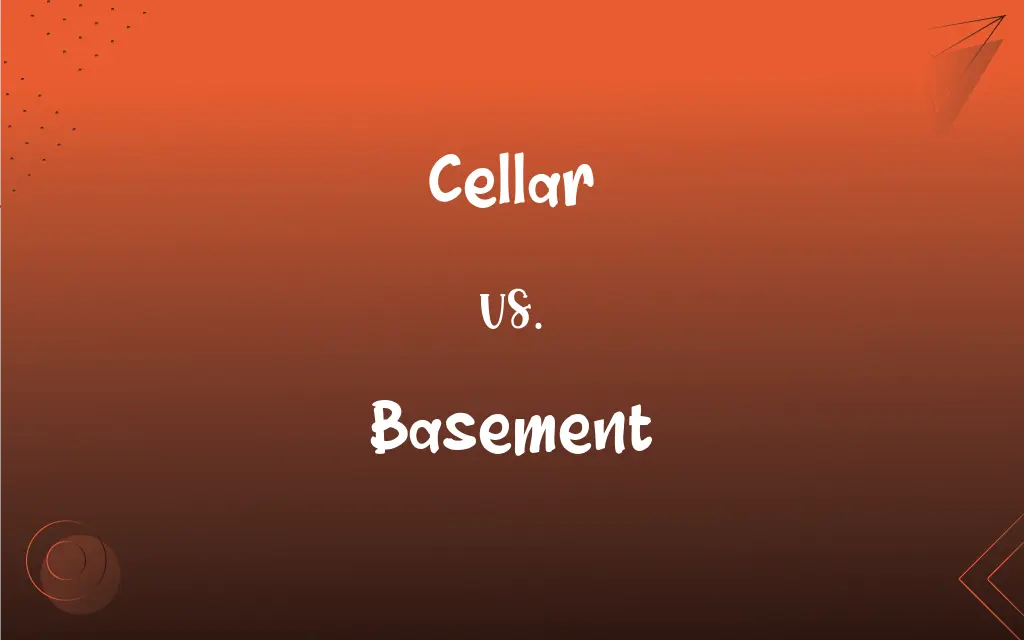Cellar vs. Basement: What's the Difference?
Edited by Aimie Carlson || By Harlon Moss || Updated on October 23, 2023
A cellar is primarily for storage, often of wine or food, while a basement is a general below-ground space in a home that can serve multiple purposes.

Key Differences
Both cellar and basement refer to spaces located beneath the main floor of a building. However, a cellar is typically understood as a specific kind of storage space, often dedicated to the preservation of wine, food, or other goods. Basements, on the other hand, are broader in their function and can be used for a variety of purposes, such as living areas, recreational spaces, or storage.
While the term cellar often invokes imagery of wine racks, cool temperatures, and dim lighting, it doesn't exclusively mean a wine storage area. It can also be a place where canned goods, root vegetables, and other perishables are stored. Basements, being more versatile, can be fully finished living spaces, featuring bedrooms, bathrooms, and entertainment areas, or they might be unfinished areas housing utilities.
Architecturally, the difference between cellars and basements may also relate to their position relative to ground level. Often, a cellar may be entirely below ground, ensuring a consistent cool temperature ideal for storage. In contrast, basements might be partially or entirely below ground, and their design may accommodate windows and more ventilation.
It's essential to recognize regional differences in language use. In some parts of the world, cellar and basement might be used interchangeably. Still, in many American contexts, the distinction between a storage-focused cellar and a more versatile basement remains evident.
Comparison Chart
Primary Purpose
Storage, often of wine or food
General below-ground space with multiple potential uses
ADVERTISEMENT
Position
Typically entirely below ground
Can be partially or entirely below ground
Temperature
Often cooler for preservation
Variable, depending on use and finish
Common Imagery
Wine racks, canned goods, dim lighting
Living areas, utilities, windows
Interchangeability
Sometimes used interchangeably with "basement" in some regions
Broader term, encompasses various below-ground spaces
Cellar and Basement Definitions
Cellar
A space specifically for storing wine.
The mansion boasted an extensive wine cellar.
ADVERTISEMENT
Basement
A lower ground floor used for various purposes.
The laundry machines were located in the basement.
Cellar
An underground chamber or vault.
The castle had a secret cellar hidden beneath the main hall.
Basement
A story of a building that's below the main or ground floor.
The kids loved playing in the finished basement.
Cellar
A room below ground level in a house, often for storage.
They stored their homemade jams in the cellar.
Basement
The foundational substructure located beneath a building.
The building was sturdy, built on a solid basement.
Cellar
The lowest region or floor of a structure.
The tornado approached, and everyone rushed to the cellar for safety.
Basement
The floor of a building partly or entirely below ground level.
They converted their basement into a game room.
Cellar
A space where perishables are stored to remain cool.
During summer, vegetables were kept fresh in the cellar.
Basement
An underground level that can be used as living space.
Their basement apartment was cozy and affordable.
Cellar
A room or enclosed space used for storage, usually beneath the ground or under a building.
Basement
The substructure or foundation of a building.
FAQs
Is a cellar always completely underground?
Typically, but not always. Its main feature is its cooler temperature for storage.
Can a basement also function as a cellar?
Yes, a section of a basement can be conditioned as a cellar for storage.
Can both cellars and basements have windows?
While cellars usually don't, basements can have windows, especially if they're not entirely underground.
Is a basement the same as a foundation?
No, the foundation supports the house, while the basement is a usable space within the foundation.
Can a building have both a cellar and a basement?
Yes, a building might have a dedicated cellar for storage and a larger basement for other uses.
Are cellars and basements common in all types of residences?
No, their presence varies based on architectural designs and regional preferences.
Are all cellars used for wine storage?
No, cellars can be used for various storage needs, not just wine.
Why are cellars often cooler?
Being underground, they're insulated from external temperature changes, making them cooler.
Are basements prone to flooding?
They can be, especially if not properly waterproofed or in flood-prone areas.
Can a basement be a separate rental unit?
Yes, in many places, basements are converted into apartments and rented out.
Do all homes with basements also have cellars?
No, while some might, others only have a general basement space.
Which is more expensive to build, a cellar or a basement?
Costs vary, but generally, a fully finished basement might be more expensive than a basic cellar.
Can you convert a cellar into a living space?
It's possible, but considerations like ventilation, light, and height must be addressed.
What's the main advantage of having a basement?
It provides extra space, which can be used for living, storage, or utilities.
Which is more common in American homes, cellars or basements?
Basements are more common, but some homes, especially older ones, might also have cellars.
Can you live in a cellar?
Typically, cellars aren't designed for living, while basements can be conditioned as living spaces.
Why might someone want a cellar in their home?
For the purpose of storing perishables, wine, or other items needing a cool environment.
Are all basements dark and windowless?
No, many basements, especially those not fully underground, have windows for light and ventilation.
Are cellars common in modern homes?
While not as common as basements, cellars are still found in homes, especially for specific storage needs.
Is a "root cellar" specifically for storing vegetables?
Typically, yes. It's designed to store root vegetables and other perishables.
About Author
Written by
Harlon MossHarlon is a seasoned quality moderator and accomplished content writer for Difference Wiki. An alumnus of the prestigious University of California, he earned his degree in Computer Science. Leveraging his academic background, Harlon brings a meticulous and informed perspective to his work, ensuring content accuracy and excellence.
Edited by
Aimie CarlsonAimie Carlson, holding a master's degree in English literature, is a fervent English language enthusiast. She lends her writing talents to Difference Wiki, a prominent website that specializes in comparisons, offering readers insightful analyses that both captivate and inform.































































